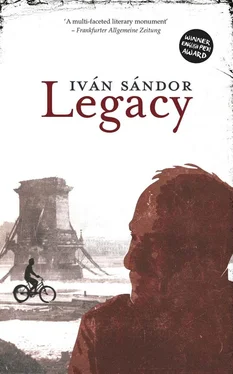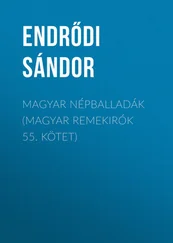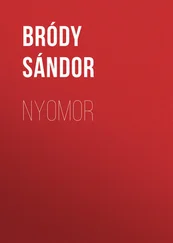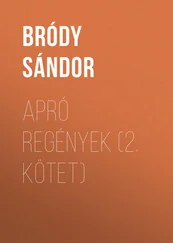Before supper I make another trip up to the second floor. It’s the same person as yesterday who opens the door. I have to wait. Vera comes along in a posse of girls. She has let down her hair and has had it tied up with a white ribbon. I tell her I’ve come across a person I vaguely know; she has, too, a classmate, an awfully nice girl. She says that so deliberately as if she were years older. She puts an arm around me — I think just so the others can see. The corridor takes a turning beyond the glass door, and there are some armchairs at the turning. The woman with the white headscarf has a little girl with very long hair sitting in her lap; the women is raking through the hair with a fine-toothed comb, hunting on her scalp between the hair strands. She’s got lice, Vera whispers and asks when I can come again. Tomorrow just before suppertime.
Supper consists of powdered soup — BB packet soup it was called. Along with the bread this time we get a slice of Hitler lard; a thin slice of jam from a block is also dispensed. The grandparents of the Riegler boys are in the ghetto; I tell them my grandma is probably also there. One can see the top end of Andrássy Avenue from the window at the end of the corridor. There are few people on it; mostly Arrow Cross patrols. The boys say it’s likely they are coming from number 60 because that’s their GHQ.
I sit on the palliasse. A tall boy comes in; he is eighteen or so. Did you come yesterday? We go out into the corridor. He introduces himself: Soproni he is called. He doesn’t give a first name. He has a little toothbrush moustache. He asks if I have any forged papers. I haven’t. If I have five pengő he can get me some, not that he needs the money, but the movement does, paper has to be obtained, stamps have to be made and the printing also costs. For the time being they can do identification papers for messengers in the Levente Youth Army Corps, the sort of thing that would pass muster during an air-raid alert. I count out the money. He asks me for my personal details, getting me to choose a new name. I also alter the final letter of my mother’s maiden surname from ‘i’ to ‘y’, and I choose my father’s birthplace of Kiskunhalas as my own. What about your religion, he asks; we agree on Roman Catholic. Vera ought to get papers as well. That’s tougher, he says. For the time being we only have the stamps for Levente messengers, which can’t really be used for a girl.
Someone is always running in the corridor. There must be small children somewhere because one can hear the sound of their cries. The elder of the Rieglers is standing by the window. He says nothing; neither do I. In one corner of the room one of the lads kicks a smaller boy, who tries to kick back, but the bigger boy catches his leg and starts dragging him along with the smaller boy now hopping on one leg and yelling. Riegler quietly tells the older boy, Stop that! He doesn’t, so Riegler socks him one on the jaw. The lad is thrown back against the wall and in getting to his feet squares up for a fight. Everyone is paying attention. Before the lad can lay a hand on him, Riegler lands a second blow and just says, Stop it! Back to your place!
We again take up positions next to each other at the window, again saying nothing. Riegler has a strong jaw, bowed lips and a straight nose. Not Jewish-looking, I reckon. Nor is my nose, I believe. Last year when one of the senior boys wearing a Levente cap spat at me in the street, he said you don’t even look like a sheeny, you little shit. Riegler has a head of thick brown back-combed hair. My own is brown as well. Once after washing it I pegged my mother’s hair-grips into it so that it would dry wavy. My parents had guests staying, and Mother’s woman friend went to the bathroom. I heard her asking her, Rosie, do you let your little boy use your hair-grips? Mother chuckled. I would never have been able to thump that boy for mistreating the younger one. I’m pleased Riegler did it.
He asks how my parents managed to get from Hegyeshalom to the Alice Weiss Hospital, and I tell him what I have learned from Jolán Bors. He had given the office false personal information, he whispers; he was actually seventeen. At the brickworks he had arranged to join the under-sixteens in such a way that his younger brother had gone over first, then their father — the old man is the term he uses — had slipped over to the brother and told him, and an Arrow Crosser started beating him back into place and the old man put on a huge act about only wanting to say goodbye to his little boy. He embraced my brother and whispered that he should pass him his registration form — the old man was pretty savvy to working tricks like that. He brought the registration form for me and started pushing me over towards the under-sixteens’ group, making sure the date of birth would not be checked by the same Arrow Crosser that had already seen my brother’s form. With us no one had looked at our registration forms, I tell him; we were simply allowed to go over to the Red Cross group. That’s just it, he says, sometimes they do and then again sometimes they don’t. It all depends on that, but don’t tell anybody that I’m over seventeen. His glasses have steamed up; he takes them off and wipes them. He’s got long fingers. He notices I am looking at them. I play the piano. His voice is different from the one in which he recounted the scene his father had staged at the brickworks. Tell you what, I’m not half going to miss the practice!
I would like to repay the confidence, so I tell him it’s also possible to get papers from Soproni for five pengő. I know, we’ve got one, too; it counts for fuck-all if they really check, although it’s still worth five pengő.
I ask him what happens if there is a proper identification check, and I hand over the one that’s worth shit. There’s no telling with a bloke who’s set on murder. I spoke about that with my old man, and he said that in such a case you had to try to look the fellow straight in the eye and just stick it out. I don’t see him as being any older now; it’s even almost as if he were younger than me. I don’t get it, I tell him. What the hell has getting it to do with anything? I don’t get what makes someone want to kill. You being a Jew, that’s what. That’s what I don’t get. Let’s leave it, mate; there’s no way of getting to understand that. I tell him that on Francia Road, which Vera and I had gone down on our way to Thököly Road, there had been a pair of Arrow Cross men coming the other way and I had greeted them with Persevere! That’s what I mean: look them straight in the eye. Then they don’t shoot? Maybe they will, maybe they won’t; that will come out in the wash after they have either shot or not shot.
I ask him how long, in his view, is it worth staying here in the home. He doesn’t know. This is a good trolley bus to ride, he says, but you have to get off it while you still can. And how can one tell when it’s time to get off? He doesn’t answer.
The cross-eyed lad, who’s slumped against the wall, once more starts the game of pretending he is masturbating. He again begins clutching the air in front of his buttoned-up fly. Howls of laughter. Forget him, says Riegler; that prick has never had a real orgasm in his life, you can take it from me.
We sit back down on my palliasse. I slowly start to unpack my haversack. At the bottom of it is the shell that I took from the Róbert family’s apartment. I show it to him; he takes it and presses it to an ear. Nice, he says. Is that yours? It is now that it sinks in for the first time that I have actually appropriated the shell, although I feel that is not of very much significance, given that everyone is swiping stuff, and I had simply borrowed it and would give it back to ‘Uncle’ Róbert after the war was over. Every sound is there in the shell, I say, including what we are saying right now. He gives it back then ruffles my head like adults do. Watch out that none of the lads pinches it. Does that happen often? There have been some cases, not here but in the other room. That’s when a shake-down is ordered. And what’s that? Two of the orderlies for the floor come in, and you have to lay all your stuff on the palliasse. They search everything, and if they come across anything that’s been stolen they take it away and you’re punished by being given so many days on bread and water.
Читать дальше












